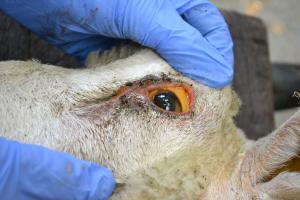The AFBI disease surveillance laboratories at Stormont and Omagh saw peak numbers of cases of chronic copper poisoning in sheep during the summer of 2015.

While copper is an essential part of enzymes governing many biological functions, sheep are particularly susceptible to the toxic effects of excess copper. Toxicity is most frequently observed in the Charollais, Texel and Suffolk breeds, and less frequently observed in the mountain breeds.
Clinical disease follows a period of excess intake and occurs when the liver’s capacity to store excess copper is exceeded and there is a sudden release of copper by the liver.
This typically occurs after weeks or months of accumulation of copper and often coincides with a period of stress on the animal. The sudden release of copper by the liver causes haemolysis and irreversible damage to the kidney and the brain. Copper poisoning is slow to develop but sudden in onset.
The eyes and skin become jaundiced and post mortem examination reveals an orange liver, black kidneys, and red/brown urine. Biochemistry results show a toxic level of copper in the liver and the kidney.
Serum copper levels do not provide a reliable warning of imminent toxicity. While blood tests for liver enzymes can assess how much damage has occurred to the liver these tests are not specific for copper toxicity and liver damage can be due to other conditions such as the presence of parasites.
Feeding concentrates containing high levels of copper, excessive administration of copper containing mineral supplements or boluses, and grazing pastures which have been dressed in pig slurry are typical scenarios in which cases of copper toxicity in sheep may develop.
However, even a diet with an acceptable copper concentration can also cause subclinical toxicity if fed for long enough to vulnerable breeds. This is because copper is a cumulative poison with the combination of daily exposure and prolonged feeding playing a part.
Every opportunity to reduce the concentrate intake between lactations should be taken. Particular care should be taken with rams as they are usually fed concentrates more regularly and for more prolonged periods.
The best way of managing this condition is to minimise long-term concentrate use in the diet.
Treatment options exist but they are only effective in the early stages of the clinical disease and are not always effective. Contact your local vet for advice if you are concerned about copper poisoning.
If you would like a post mortem carried out on a suspect case, this can be undertaken at our Stormont or Omagh laboratories but should be arranged via your local vet who can advise on carcase submissions.
Notes to editors:
AFBI carries out high-quality technology research and development, statutory, analytical, and diagnostic testing functions for DARD and other Government departments, public bodies and commercial companies
AFBI's Vision is “Scientific excellence in Northern Ireland … serving the world”.
All media enquiries to AFBI Press Office 028 9025 5326
Latest news
- AFBI issues Nematodirus warning – Spring 2025 11 April 2025
- Managing Nature Based Risks to the UK Economy and Opportunities for Green Finance 08 April 2025
- AFBI Hillsborough host AERA committee 27 March 2025
- The Omics Days Conference 27 March 2025
